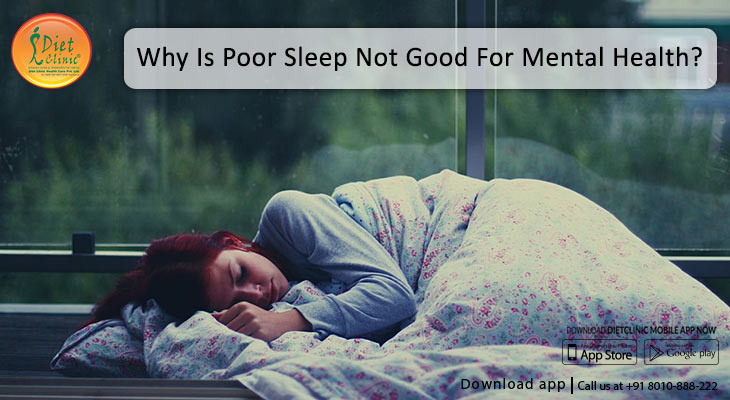
Dietician Sheela Seharawat
Sleep is of paramount important to our health as eating, drinking and breathing. Lack of sleep or sleep disorders is not only responsible for many physical health problems including weak immune system but also affects our mental wellbeing causing problems like anxiety and depression.
Studies conducted on the subject have revealed that a good night’s sleep is the key to mental and emotional resilience, whereas, sleep deprivations sets up the stage for emotional outbursts and negative thoughts.
The Relation between sleep and our mental health
Have you ever had an energized and happy morning waking up after a night full of restlessness and discomfort?
Well! The answer would only be NO.
You must know that a good night’s sleep is not only important for a good morning, but is essential for our mental health too. Poor sleep has been linked with problems like depression, anxiety, inability to think properly, memory problems, risks of heart diseases and cancer, poor immunity and weight gain and over all poor productivity at work.
Here are some fast facts about sleep deprivation:
When we fail to accredit the required amount of sleep, we start to accumulate sleep debt.
Amongst all, children and young adults are the ones, who are negatively affected the most.
Lack of proper sleep can be attributed as a symptom of some undiagnosed health problem.
Lack of proper sleep has been associated in playing a major role some tragic accidents in airplanes, automobiles, trains, ships and nuclear plants.
Sleeplessness has alerts normal function of the memory, thereby disrupting attention and focus.
Causes of sleep disorders
Sleep deprivation happens when we do not the required amount of sleep necessary for healthy being, which ranges from minimum of 7 hours to a maximum of 10 hours depending on our age and health conditions.
Sleep deprivations could be intentional as some group of people strongly thinks that sleep is just a sheer waste or time and purposely deprive themselves of sleep in the quest to pursue other things such as sports, entertainment or may be money making pursuits. This is a common cause mostly found in teenagers, young adults and some over ambitious peoples. There are also conditions of unintentionally not getting enough sleep because of certain conditions like night shifts, job demands and family obligations.
Regular patterns of going late to bed and getting up early, frequent night outs or late night schedules and lifestyle habits can lead to sleep deprivation and contribute to sleep debt.
Some additional causes related to medical conditions such as obstructive sleep apnea, depression, hormonal imbalances, and chronic illnesses also lead to sleep deprivation.
Effects of Sleep disorders
Sleep disorders can negatively affect a range of system in us alike:
Lack of sleep can affect body weight.
Not sleeping enough increases the risk of cardiovascular disease.
Poor sleep can affect hormone production, including the growth hormones and testosterone in men.
Prevents the body from strengthening the immune system and this means we can take longer to recover from illness as well as having an increased risk of chronic illness.
Affects our ability to think and reduces our memory. In other words affects our brain health and thereby our mental health on the whole.
Diet and Good Sleep
There are many ways of improving our sleep quality including making certain changes in our dietary pattern. Here are some foods that we should incorporate in our daily diet to promote good sleep:
Almonds: promotes good sleep as good source of the sleep-regulating hormone melatonin. Also it has magnesium that help improve sleep quality, especially for those who have insomnia. Magnesium’s role in promoting sleep is due to its ability to its ability to reduce inflammation. Additionally, it may help reduce levels of the stress hormone cortisol, which is known to interrupt sleep.
Kiwi Fruit: are rich sources of serotonin (a brain chemical that helps regulate your sleep cycle) and antioxidants, both of which are associated with improving sleep quality when eaten before going to bed. Further, eating kiwis promotes digestive health, reduce inflammation and lower your cholesterol.
White Rice: a staple diet of many countries, white rice is high in carbs and low in fiber that contributes to its high glycemic index. Eating foods with a high glycemic index, such as white rice, a few hours before bed may help improve sleep quality.
Fatty Fish: such as salmon, tuna, trout and mackerel, is unique in their exceptional vitamin D content. Also are high in healthy omega-3 fatty acids, which are known for reducing inflammation, protect against heart disease and boost brain health. Omega-3 fatty acids and vitamin D combination in fatty fishes increases the production of serotonin, a sleep-promoting brain chemical and will help you fall asleep faster and sleep more deeply.


.png)






